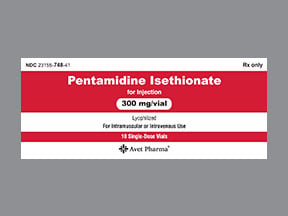My prescription
Edit
300MG, Pentamidine (1 Solution Reconstituted)
Select pharmacy

CVS
$59.04
COUPON PRICE
Albertsons
$28.60
COUPON PRICE
Walmart
$88.80
COUPON PRICE
Walgreens
$105.50
COUPON PRICEPentamidine savings card
Show this card to your pharmacist
Albertsons
$28.60
BIN
ID
PCN
GRP
019876
LHFE1C1945
CHIPPO
LHX
Powered by
More prescriptions for pneumonia
More prescriptions for pneumonia
Price history for Nebupent (brand) & Pentamidine (generic)
1 Solution Reconstituted, 300MG
Average retail price for Nebupent
Average retail price for Pentamidine
Average SaveHealth price for Pentamidine
Our price history data is based on aggregated prescription data collected from participating pharmacies in America. Our prescription data updates daily to reflect the latest price changes. If you notice a missing data point, it means there wasn't sufficient data available to generate a monetary value for that date.
We analyzed Pentamidine prices for (300MG, 1 Solution Reconstituted) over the last 12 months. The average retail price was $848.00, while the average price using the SaveHealth discount card was $93.70. That's a savings of approximately 88.95% when using our Pentamidine coupon.
Compared to the generic version, Nebupent had an average price of $186.99 over the same time period. With the SaveHealth savings card, Pentamidine is 49.89% cheaper on average than Nebupent.
*Retail prices are based on pharmacy claims data, and may not be accurate when we don't have enough claims.
Pentamidine dosage forms
Dosage Quantity Price from Per unit 300MG 1 Solution Reconstituted $28.60 $28.60 300MG 10 Solution Reconstituteds $218.53 $21.85
| Dosage | Quantity | Price from | Per unit |
|---|---|---|---|
| 300MG | 1 Solution Reconstituted | $28.60 | $28.60 |
| 300MG | 10 Solution Reconstituteds | $218.53 | $21.85 |

